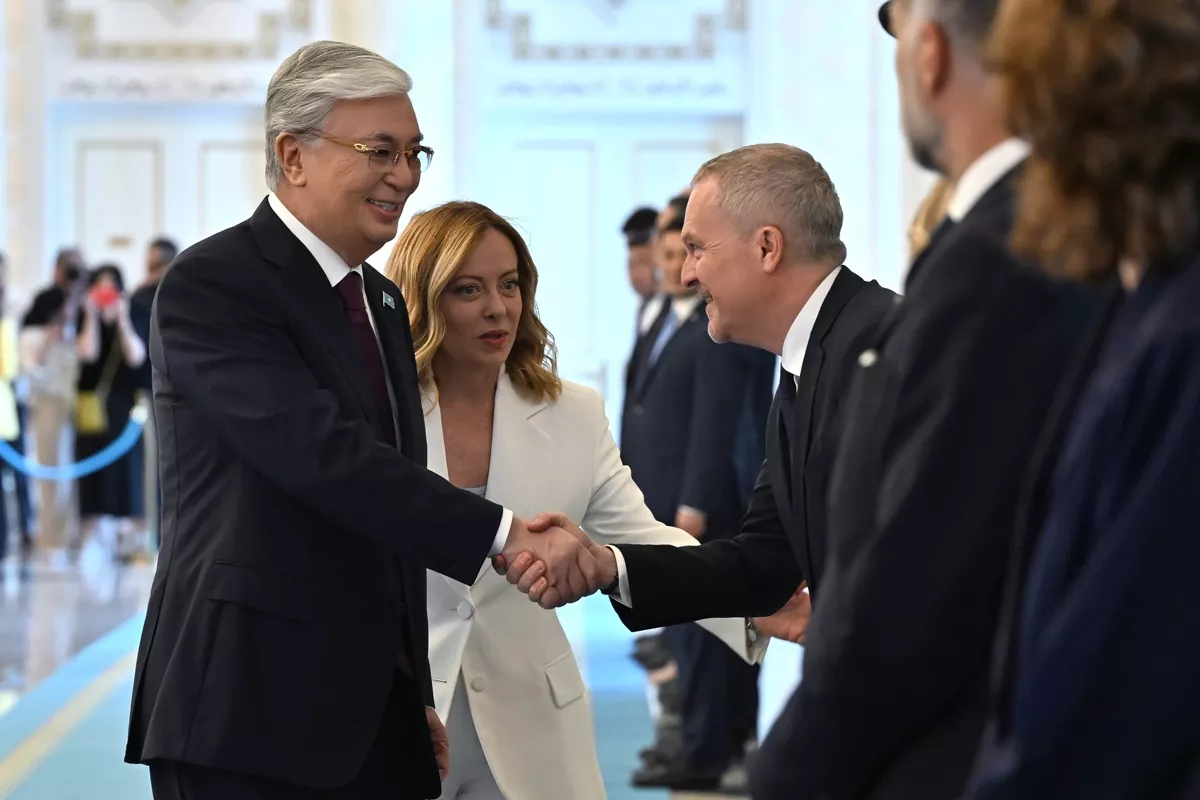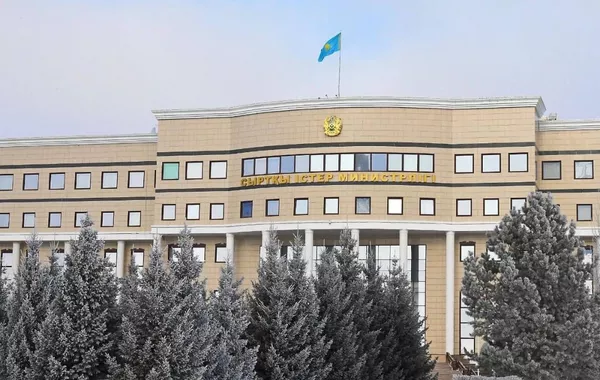
Italian Prime Minister Giorgia Meloni introduces members of her delegation to Kazakh President Kassym-Jomart Tokayev (left). (Photo: akorda.kz)
Italian Prime Minister Giorgia Meloni, visiting Central Asia to pursue agreements, referenced numerous names during her policy speech at the Astana International Forum.
First, she went for the low-hanging fruit, giving a shout-out to Marco Polo, pointing to the legendary 13th century Venetian merchant-explorer to support her assertion that it is in “the DNA of the Italian people” to seek new trade possibilities, The Caspian Post reports citing Eurasianet.
She then dusted off a name that had fallen out of favor for decades - Halford Mackinder, the early 20th century British geographer who is considered a founding father of geopolitics - to explain why she was participating in a May 30 summit with the leaders of all five Central Asian states. She referred to Mackinder’s heartland theory, a concept developed in 1904 that asserts the nation which controls the heartland’s abundant natural resources will dominate global politics.
She described Central Asia as the hinge of Mackinder's heartland, “one of the pivots around which the fate of the world revolves.”
Meloni sounded profound and sincere but invoking Mackinder’s century-old ideas seemed somewhat out of sync with the substance of her message that the post-World War II system is broken, and nations now need to “look beyond the horizon” to create a new order. “Everything around us is changing and the few certainties we thought we had are no longer there,” she stated.
In one respect, the Mackinder reference says a lot about how the European Union (along with the United States) is grappling with changing realities. The calls by Meloni and others for new thinking aren’t being matched by actions to put an actual strategy in all the “strategic partnerships” being forged with Central Asia.
That Meloni retreated so far back into the past, instead of citing a more contemporary thinker to offer an intellectual framework for engagement with Central Asia, merely underscores a lack of vision, not just by Italy, but also the European Union and the United States. Mackinder may have been prescient in anticipating the importance of Central Asia’s natural resources, but one should keep in mind that he formulated his ideas when an airplane could barely fly a few hundred feet, international finance rested on the gold standard, battleships were kings of the seas and AI was something right out of H.G. Wells. The complexity of global supply chains was unfathomable to him. His frame of reference was colonial.
The Mackinder reference can also be seen as a mea culpa of sorts, tacit recognition that Western nations are playing catch-up in Central Asia, finally recognizing more than 30 years after the Soviet collapse that the region has a lot more to offer than oil and natural gas.
For all of Meloni’s talk about a need “to look beyond geographic boundaries,” her visit to Central Asia stuck to largely familiar terrain. The announcements published during her visit sounded a lot like those produced following April’s EU-Central Asia summit in Samarkand, or those coming out of Washington regarding a desire to strike deals for critical minerals, build out the Middle Corridor and forge strategic partnerships. Long on aspiration, short on details.
Overall, the Italian delegation concluded 7 billion euros worth of investment deals with Uzbekistan and Kazakhstan, but the statements contained few specifics about the projects. The joint statement issued following the summit featured the usual language about creating an “open and constructive dialogue,” while expressing an intent to “expand cooperation in interrelated areas such as natural resources, climate and energy - including renewable energy, (e.g. solar, wind, hydropower etc.), critical raw materials, agriculture, connectivity and critical infrastructure - including through the EU’s Global Gateway strategy.” But again, details were scant on how to achieve the lofty goals.
One area where Italy seemed to set itself apart from the EU in general and the United States was an interest in helping Central Asian states address water resource management challenges and improve agricultural productivity.
Still, while EU and US officials seem to know where they want to go in Central Asia, they don’t seem to have a good road map to get there.
Central Asian states aren’t shy about wanting to give the EU and US directions. Both Kazakhstan and Uzbekistan are keen to have Western powers involved in the carbon and critical minerals sectors, as well as the development of green energy solutions. But they don’t want to merely be sources of raw materials; they want to be refiners and exporters of finished products. Thus, for cooperation to be successful, a solid infrastructure needs to be established. There needs to be follow-up.
At the summit, Uzbek leader Shavkat Mirziyoyev outlined steps that Central Asian states want to see taken, calling for a “comprehensive multilateral Program of Industrial and Technological Cooperation” enabling “technology transfer, the introduction of advanced knowledge and best practices, [and the] creation of high-tech industrial facilities.” The watchword he used was “localization.”
Kazakh President Kassym-Jomart Tokayev sounded similar notes, calling for the creation of a mechanism in which raw materials are exchanged for investment, technology and know-how in other areas. He also expressed a desire for Western geological expertise to help map deposits of critical minerals.
Both Mirziyoyev and Tokayev called for systematic and regular diplomatic consultations, as well as significantly expanded educational exchanges. They want to feel confident that Central Asia will remain on the West’s radar.
To build effective strategic partnerships, then, EU members along with the United States need to listen more and have the patience to lay the groundwork to expand trade while helping Central Asian states in ways that China and Russia cannot, providing knowledge and resources that assist the region in confronting climate change, building local capacity and making the most efficient use of dwindling water resources.
The heartland has grown a lot more complex since Mackinder’s day. As Tokayev noted in his opening speech at the Astana International Forum: “We must recognize that the threats to global security are not only geopolitical.”
Share on social media
